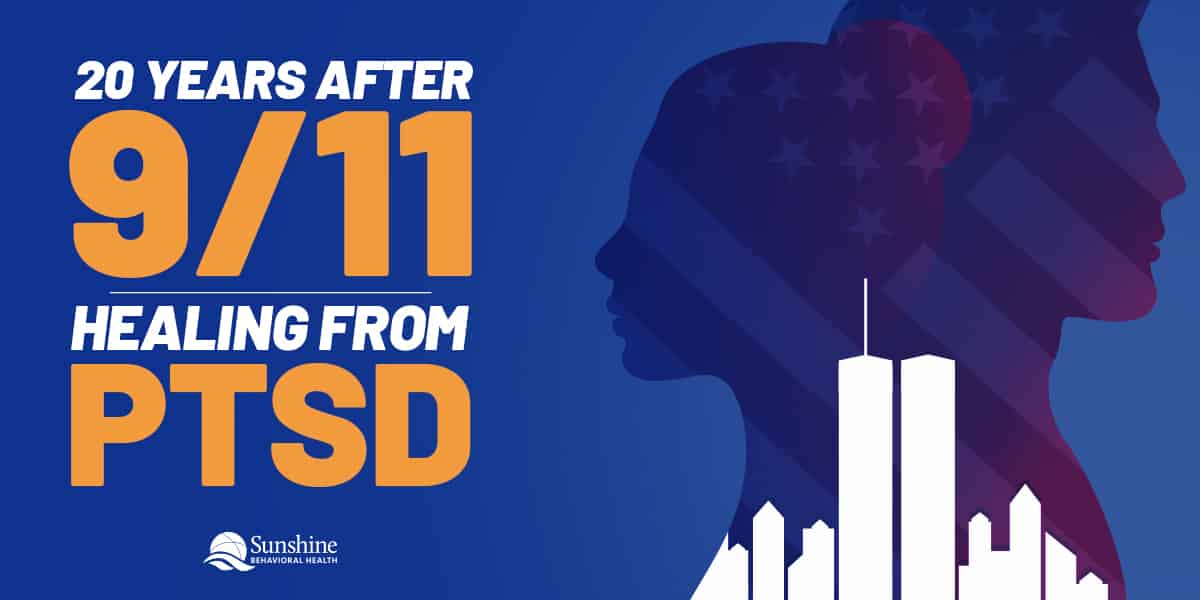
The 20th Anniversary of 9/11: PTSD for Survivors Is Still a Very Real Issue
September 11, 2021 marks the 20th anniversary of the September 11 terrorist attacks. The day that saw the four planes hijacked by terrorists will likely be etched in the memories of every American – and many around the world – who were alive to see it. For many, including those who survived or lost loved ones on this day, the PTSD caused by the event is still a very real struggle.
Some may not have many symptoms anymore, but others find that day-to-day life is a challenge, and coping with their emotional trauma is more challenging than they ever could have imagined it would be.
How Does PTSD Start?
Post-traumatic stress disorder (PTSD) is a condition that can occur when someone experiences a traumatic event that they had no control over. Often, we associate this condition with people who have returned home from war, or experienced situations such as extreme deadly weather events, or other types of situations such as car accidents.
In the case of 9/11, almost anyone alive who was aware of the news can be affected by PTSD, because, while not everyone was in New York City, the Pentagon, or southern Pennsylvania on that day, the news coverage, as well as the fear, outrage, and sense of hopelessness was widespread.
When a traumatic event occurs, it can be very difficult for the brain to process, so as a result, one may begin reliving the event even when they don’t want to. Those same feelings and fears circle back every time a trigger is introduced, which can be almost anything that reignites the feelings of the past event.
How Do People Cope with PTSD?
The symptoms of PTSD can be mild, and some cases may resolve themselves with time, or they can become severe, in which case it may be necessary to seek therapy and medications to help deal with the effects of this condition.
Sometimes, when people don’t realize that they are coping with a treatable condition, they may try to self-medicate by using substances or alcohol to numb their feelings and feel “normal.” It’s important to know that drinking alcohol or using substances to quiet feelings you might be having can quickly lead to an addiction, which may require treatment at a rehab to overcome.
In other cases, people may think that suicide is the only way to escape their feelings of hopelessness and desperation.
Do You or a Loved One Struggle with PTSD?
We now know that many situations can cause one to experience feelings of PTSD. It doesn’t matter the severity of the event, it just matters how the individual was affected by it. If you or a loved one is struggling with PTSD, it’s important to get help.
Since PTSD can contribute to so many other mental and emotional issues, such as suicidal thoughts and addiction, seeking treatment for this condition is essential, and help is widely available.
If you or a loved one is struggling with PTSD, don’t suffer in silence. We continue to learn about this condition and its effects all the time, and there are ways to treat it so you can start living a healthy, happy life again.
Sources
history.com – September 11 Attacks
mayoclinic.org – Post-Traumatic Stress Disorder (PTSD)
sunshinebehavioralhealth.com – PTSD and Addiction
A Message From Our CEO
Medical disclaimer:
Sunshine Behavioral Health strives to help people who are facing substance abuse, addiction, mental health disorders, or a combination of these conditions. It does this by providing compassionate care and evidence-based content that addresses health, treatment, and recovery.
Licensed medical professionals review material we publish on our site. The material is not a substitute for qualified medical diagnoses, treatment, or advice. It should not be used to replace the suggestions of your personal physician or other health care professionals.






